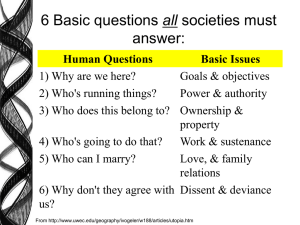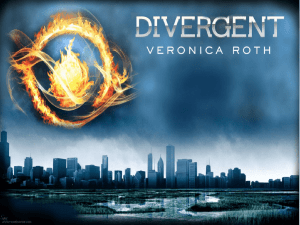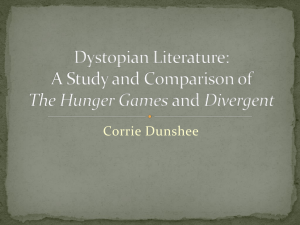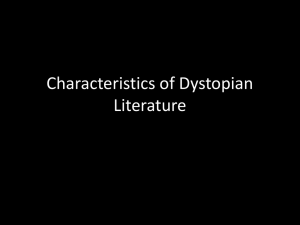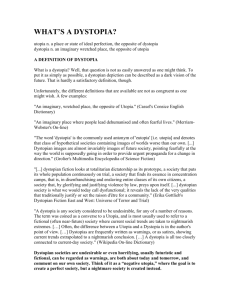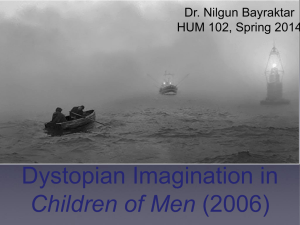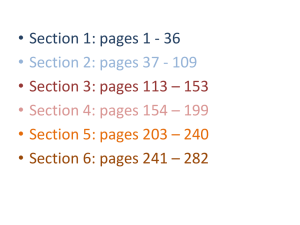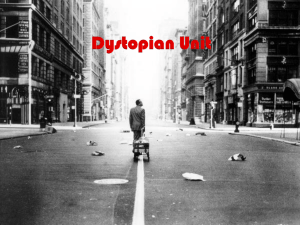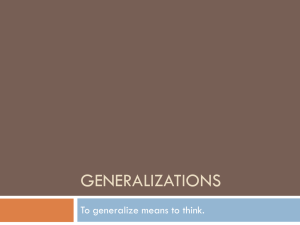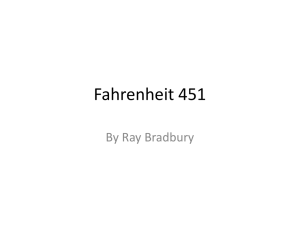control - Concordia Shanghai Teacher Websites
advertisement
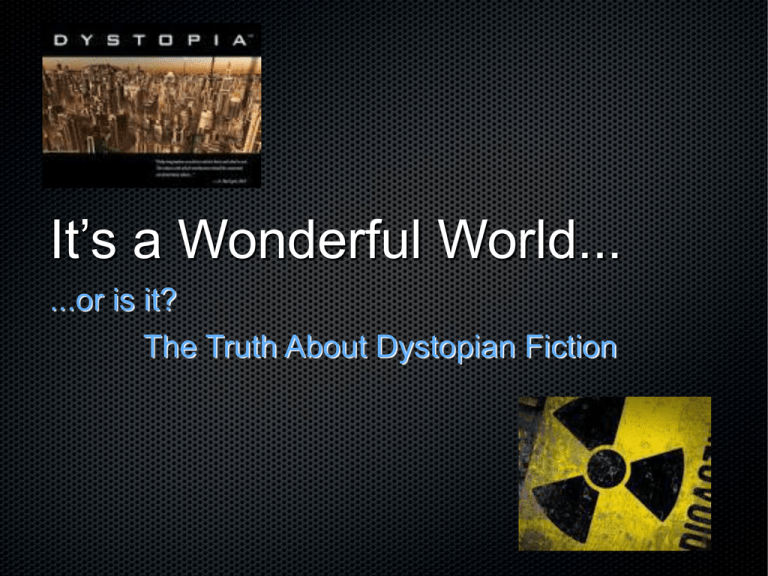
It’s a Wonderful World... ...or is it? The Truth About Dystopian Fiction “Radioactive” - Imagine Dragons I'm waking up to ash and dust I wipe my brow and I sweat my rust I'm breathing in the chemicals (inhale) (exhale) I'm breaking in, shaping up, then checking out on the prison bus This is it, the apocalypse Whoa I'm waking up, I feel it in my bones Enough to make my systems blow Welcome to the new age, to the new age Welcome to the new age, to the new age Whoa, oh, oh, oh, oh, whoa, oh, oh, oh, I'm radioactive, radioactive Whoa, oh, oh, oh, oh, whoa, oh, oh, oh, I'm radioactive, radioactive I raise my flags, don my clothes It's a revolution, I suppose We're painted red to fit right in Whoa I'm breaking in, shaping up, then checking out on the prison bus This is it, the apocalypse Whoa • Read more: Imagine Dragons - Radioactive Lyrics | MetroLyrics Answer after: How is “Radioactive” a dystopia theme song? Utopia In order to understand a dystopia (a messed-up utopia), we have to understand what a utopia is. In ancient Greece, Plato’s Republic (380 BC) was one of the first writings to touch on the idea of a “perfect” society. The pure definition of a utopia was coined by a man in England named Sir Thomas More. He wrote a tract called Utopia (pub. 1516), and that’s when the word really took off. Utopia: a place, state, or condition that is ideally perfect in respect of politics, laws, customs, and conditions. Wait...are utopias for real? YES! There are several famous examples of utopian experiments. Canberra, Australia New Harmony, Indiana Amana Colonies, Iowa Oneida community, New York Lebensraum, Germany (Hitler’s regime) Pitcairn Island, South Pacific Jacobopolis, USA Mennonite community, Delaware Charlotta, Florida Haifa, Palestine Maxwell Owenite Community, Canada Brook Farm, USA China: Attempts at a modern utopia? Think back to the Beijing Urban Planning Museum we visited during interim. We watched about video about the “Beijing of the Future.” What were some elements that seemed utopian or unachievable to you? Watch this video about Tianjin, an eco-friendly “utopian” city being built near Beijing. So if that’s a utopia... A dystopia doesn’t automatically mean “not” a utopia. A dystopia often is the result of a failed utopia. Meaning, the founders tried to create a perfect world, but, since they are human, it turned into something not so good. Dystopia: a futuristic, imagined universe in which oppressive societal control and the illusion of a perfect society are maintained through some kind of control moral, technological, bureaucratic, corporate, or totalitarian. Dystopias as Social Commentary Dystopias are often written with hints of either current or past social commentary. It is not uncommon to read of fictional situations which sound eerily familiar to us - one child policy in China, murder of the Jews during the Holocaust, perfection of society through plastic surgery, etc. Dystopias, through an exaggerated worst-case scenario, make a criticism about a current (or past) trend, societal norm, or political system. Examples of Dystopian Novels Among the Hidden - commentary about limitations on family & children (China’s one child policy) The Hunger Games - dictatorial regimes, children during war time, use of child soldiers, hint of the Holocaust/genocide, mass extermination using technological weapons 1984 - “Big Brother,” technological control of ideas, oppression & fear Divergent - destroyed society, control through factions, differences are frightening (you should fit in) Fahrenheit 451 - control of information, gov’t censorship, illiteracy, world consumed by technology Pretties, Uglies, etc. - use of plastic surgery to be “perfect” Unwound - use of technology to create a perfect world by getting rid of undesirables Characteristics of Dystopia There are commonalities among many (if not all) dystopian novels. That’s why it is a genre of literature. These are some of the characteristics of a dystopian novel: Propaganda is used to control the citizens Information, independent thought, and freedom are restricted. A figurehead or concept is worshiped by the citizen of the society. Citizens are perceived to be under constant surveillance. Characteristics, contin. Citizens have a fear of the outside world. Citizens live in a dehumanized state. The natural world is banished and distrusted. (Ex. Wall-E) This might mean the artificial formation of families or artificial production of people and goods. Citizens conform to uniform expectations - individuality and dissent are bad. There are very strict social structures which should not be crossed. The society is an illusion of a perfect utopian world. We like control! Part of a dystopia’s definition is that it’s a perfect society maintained through some kind of control mechanism. These are the four types of control that exist: Corporate control: One or more large corporations control society through products, advertising, and/or the media. Ex. - Minority Report & Running Man Bureaucratic control: Society is controlled by a mindless bureaucracy through a tangle of red tape, relentless regulations, and incompetent government officials. Ex. - Brazil Yet more control... Technological control: Society is controlled by technology - through computers, robots, and/or scientific means. Ex. - The Matrix, Terminator, and I, Robot Philosophical/religious control - Society is controlled by philosophical or religious ideology often enforced through a dictatorship or theocratic government. The Protagonist A novel’s protagonist is the main character, often the hero or heroine of the book. The action revolves around how they think, act, and feel. Katniss, The Hunger Games Guy Montag - Fahrenheit 451 Tris Prior - Divergent Neo - The Matrix In a dystopia, even the protagonists have specific characteristics that you can often see across numerous books. Dystopian Protagonist Often feels trapped and is struggling to escape. Questions the existing social and political systems. Believes or feels that something is terribly wrong with the society in which s/he lives. Helps the audience recognize the negative aspects of the dystopian world through his/her perspective *May often show reluctance to be a hero/heroine despite the above characteristics, perhaps due to family obligations, fear, uncertainty, or feeling like s/he is a pawn in a bigger game. (Miss L’s sidenote) Miss L’s Four Cardinal Points of a Dystopian Novel Loss of the Individual: There is little chance to show individuality in a dystopian novel. There are uniform expectations of citizens, usually enforced through control and fear. You aren’t able to think or do anything different from what has been established by the norm (or the authority in place). Sometimes, you are expected to physically or mentally change in order to conform to your society. If you don’t...that’s not good for you! Control & Fear - People, technology, and/or nature are highly controlled by an overarching government or corporation. There is little chance of changing it without a drastic overhaul of authority. People/citizens are held in a suspended state of fear - fear of pain, torture, death, recrimination, punishment, etc. This helps the authority figure(s) control the people the most effectively. The other points Cracks in the Foundation - Usually the novel starts with some kind of “crack in the foundation” of the dystopia. The protagonist is put the position of exploiting that “crack” in order to solve a problem or change the society. The dystopia has “peaked,” and now it must be changed - or collapse completely. Eerie Parallels to Our World - As you read, it’s important to keep in mind historical issues and current events which may “pop up” in a dystopian novel. Since it’s meant to be a commentary, in a way, about our own world (disguised as fiction), you should notice these commonalities. What social and/or historical issues do you see being discussed in the novel? Quotes from/about Dystopian Novels How are some of these quotes representative of dystopian societies? “Human reason can excuse any evil; that is why it's so important that we don't rely on it.” ― Veronica Roth, Divergent “Everything - our houses, our clothes, our hairstyles - is meant to help us forget ourselves and to protect us from vanity, greed and envy, which are just forms of selfishness. If we have little, and want for little, and we are all equal, we envy no one.” ― Veronica Roth, Divergent “And what would they be scared of? There's nothing to fear in a perfect world, is there?” ― Catherine Fisher “Someday all the wilds will be razed, and we will be left with a concrete landscape, a land of pretty houses and trim gardens and planned parks and forests, and a world that works as smoothly as a clock, neatly wound: a world of metal and gears, and people going tick-tick-tick to their deaths.” ― Lauren Oliver, Pandemonium “Knowledge is dangerous.” ― Patrick Ness “No one believes more firmly than Comrade Napoleon that all animals are equal. He would be only too happy to let you make your decisions for yourselves. But sometimes you might make the wrong decisions, comrades, and then where should we be?” ― George Orwell, Animal Farm “The life where nothing was ever unexpected. Or inconvenient. Or unusual. The life without colour, pain or past.” ― Lois Lowry, The Giver “Taking the kids from our districts, forcing them to kill one another while we watch – this is the Capitol’s way of reminding us how totally we are at their mercy.” ― Suzanne Collins So... How is Imagine Dragon’s “Radioactive” like a theme song for dystopian novels? Discuss. I'm waking up to ash and dust I wipe my brow and I sweat my rust I'm breathing in the chemicals (inhale) (exhale) I'm breaking in, shaping up, then checking out on the prison bus This is it, the apocalypse Whoa I'm waking up, I feel it in my bones Enough to make my systems blow Welcome to the new age, to the new age Welcome to the new age, to the new age Whoa, oh, oh, oh, oh, whoa, oh, oh, oh, I'm radioactive, radioactive Whoa, oh, oh, oh, oh, whoa, oh, oh, oh, I'm radioactive, radioactive I raise my flags, don my clothes It's a revolution, I suppose We're painted red to fit right in Whoa I'm breaking in, shaping up, then checking out on the prison bus This is it, the apocalypse

